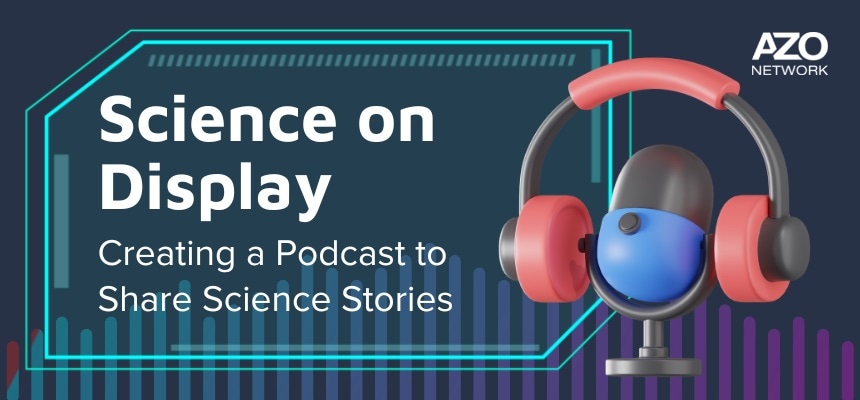
Our recent webinar, Science on Display, features an interview with Danielle Ellis, Editor for News Medical and host of the Something About Science podcast, alongside Will Soutter, Creative Video and Audio Specialist, and Sara López Segura, Graphic Designer and Social Media Co-Ordinator. In this interview, we dive into the process of creating a successful podcast by looking at the experience of the Something About Science podcast team.
You can watch, listen to or read the discussion by clicking one of the links below.
Watch Science on Display Webinar
Listen to Science on Display
Read part one of the transcript, Science on Display: Creating a Podcast to Share Science Stories
What inspired the launch of the Something About Science podcast?
We started Something About Science as scientific editors passionate about science communication. We saw a gap in the market for a podcast like ours, as we were having authentic conversations in the office about the science stories we felt passionately about.
We hadn’t previously explored the audio realm as the editorial team, and we all listened to podcasts ourselves. As audio becomes a more popular content form with people’s day-to-day lives no longer strictly nine to five or in the office, podcasts fit into the multitasking style people ask for.
What were the initial objectives for starting the podcast?
We had two main objectives when starting the podcast. Firstly, we recognized that the podcast market was very saturated and wanted to consider our position carefully. Secondly, we knew a lot of work was required before recording, and we had to be organized and set out the vision for the podcast.
What are some things to consider when starting a podcast?
When creating a podcast series, having a defined voice and planning your content is crucial. It's best practice to record the first several months of content so you can commit to a schedule and stay ahead. Scheduling is also critical for social media plans, where promoting episodes and engaging with listeners is vital.
What is the key to distribution?
Social media is a critical part of podcast distribution. Creating audiograms, which are small snippets of episodes that give potential listeners a snapshot of what the podcast is about, has been very useful. All of our podcast hosts promoting episodes has helped with engagement and showing the people behind the voices.
The Something About Science podcast has three hosts. What was the thinking behind this?
The Something About Science podcast stemmed from organic conversations that we had been having in the office. It was natural to continue this dynamic for the potential to have a more engaging discussion. We also wanted to promote the idea of AZoNetwork as a network, which the dynamic between the three of us hosting does.
How important is the continuity of the podcast?
Consistency is critical in podcasting. Listeners expect to see a new episode on a particular day and are more likely to return if they know when to expect it. A recognizable host or hosts can keep people involved and help establish credibility through consistency.
How important are branding and artwork in podcasting?
People relate a brand to its logo, and it's the first thing potential listeners see when scrolling through podcast platforms like Apple Podcasts or Spotify. Getting the artwork right is essential to attract listeners and create a professional image.
How do you get a podcast on different platforms?
There are various platforms for podcast distribution. A service like Acast distributes the podcast for you to all the other platforms.
A new show needs to be registered for an RSS feed for each platform, and some take a while. Apple can take a few weeks to come back. What we did with this podcast is created a trailer. Technically we did this because we didn’t know when the first episode we posted to Acast would go live on each platform once they were approved. It could arrive on Spotify three days later, on Deezer a day after that, on Amazon straightaway, and so on. By putting out the trailer to finish setting up that RSS feed with each platform.
What is the benefit of a one-off podcast format?
A one-off podcast format can be an excellent way to share high-value content without a presentation or slides. It's an engaging way for audiences to learn about a specific topic or issue. Alternatively, you can turn webinars into podcasts to provide multiple ways for your audience to engage with you.
Read the other two parts of the interviews from Science on Display
Science on Display: Creating Compelling Product Videos
Science on Display: Video Production and Post-Production Editing